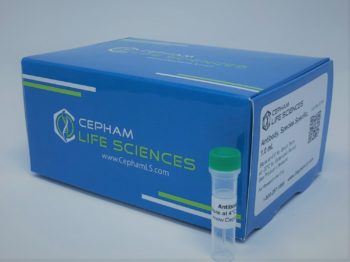Description
Aliases
EC 2.7.11.1; gamma-PAK; kinase PAK2; P21-activated kinase 2; p21-activated kinase 2; p21-activated protein kinase I; PAK 2; PAK-2; PAK65; PAKI; S6/H4 kinase
Antibody Type
Polyclonal Antibody
Uniprot ID
Swiss-Prot#:Q13177;
NCBI Gene#:5062
Immunogen
Peptide sequence around phosphorylation site of serine 141 (Y-L-S(p)-F-T) derived from Human PAK2.
Raised In
Rabbit
Species Reactivity
Human Mouse Rat
Tested Applications
WB Recommended dilution: Western blotting: 1:500~1:3000,
Background / Function
Serine/threonine protein kinase that plays a role in a variety of different signaling pathways including cytoskeleton regulation, cell motility, cell cycle progression, apoptosis or proliferation. Acts as downstream effector of the small GTPases CDC42 and RAC1. Activation by the binding of active CDC42 and RAC1 results in a conformational change and a subsequent autophosphorylation on several serine and/or threonine residues. Full-length PAK2 stimulates cell survival and cell growth. Phosphorylates MAPK4 and MAPK6 and activates the downstream target MAPKAPK5, a regulator of F-actin polymerization and cell migration. Phosphorylates JUN and plays an important role in EGF-induced cell proliferation. Phosphorylates many other substrates including histone H4 to promote assembly of H3.3 and H4 into nucleosomes, BAD, ribosomal protein S6, or MBP. Additionally, associates with ARHGEF7 and GIT1 to perform kinase-independent functions such as spindle orientation control during mitosis. On the other hand, apoptotic stimuli such as DNA damage lead to caspase-mediated cleavage of PAK2, generating PAK-2p34, an active p34 fragment that translocates to the nucleus and promotes cellular apoptosis involving the JNK signaling pathway.
Conjugate
Unconjugated
Storage Buffer
Rabbit IgG in phosphate buffered saline (without Mg2+ and Ca2+), pH 7.4, 150mM NaCl, 0.02% sodium azide and 50% glycerol.
Form
liquid
Storage
Shipped at 4°C. Upon delivery aliquot and store at -20°C or -80°C. Avoid repeated freeze.
Purity
Antibodies were produced by immunizing rabbits with synthetic phosphopeptide and KLH conjugates. Antibodies were purified by affinity-chromatography using epitope-specific phosphopeptide. Non-phospho specific antibodies were removed by chromatogramphy using non-phosphopeptide.
Modification
Phospho-Ser141
Additional information
| Size | 100?l |
|---|


